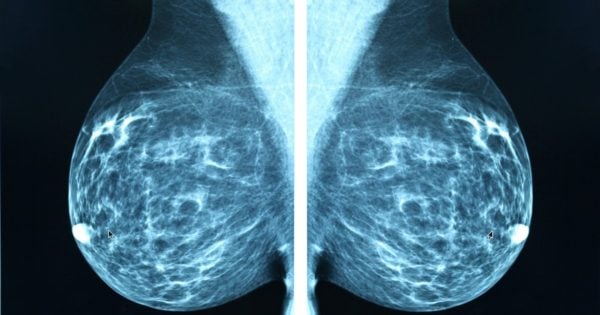With AAP
It’s a common risk factor for breast cancer – but most of us are still in the dark about breast density.
Around two-thirds of women don’t know that breast density can obscure a lump or lesion on a mammogram – making it harder for breast cancer to be detected early, a national survey commissioned by health organisation Pink Hope has found.
So what are “dense breasts” and how do you know if you’ve got them?
Basically, the denser the breast, the more white there is on the mammogram, Professor Mary Theresa Rickard, Chief Radiologist at Sydney Breast Clinic told AAP.
Listen: The women Connie Johnson kept closest speak to Mia Freedman…
“The whiter the mammogram the greater your risk of getting breast cancer,” Prof Rickard explained.
“Our chances of finding a cancer on a dense breast are not as good as they are on finding it on a fatty breast, so greater chance that your cancer will be missed if you have a dense breast.”
Unfortunately, Prof Rickard explained, high breast density is not something you can know by touching or looking at your breasts.
The the only way you can find out is if you’ve had a mammogram.
But – and here’s the problem Pink Hope wants to do something about – the radiologist performing your mammogram will not routinely tell you if you have dense breasts, unless you live in Western Australia.


Top Comments
I have my yearly mammograms at a specialized Breast Centre, where one of the Specialists does his research on breast density. He told me that breast density itself can be a risk factor for cancer and those with very dense tissue should have MRIs and can receive hormonal treatment to reduce the density. It should be the law in Australia that a woman's density is reported (using BIRADS) on the mammogram.
I'm curious though - isn't density also something to do with age? I had my first mammogram at about 38 or 39 (followed by an U/S because I was concerned about something in particular) and was told that I had dense breasts but also told that this was most likely due to my age, as younger woman have denser breasts? I assumed that as I aged (and got closer to the age that woman usually start having mammograms - 50) that this would somewhat right itself if you know what I mean?
It may not be law, but it is medical convention to do so. We don't need a law to work to clinical standards.
Why shouldn't it be made law? There are laws about mandatory reporting of child abuse, sexually transmitted diseases and not all doctors do inform their patients of breast density. I would be curious if Breast Screen does as the majority of women are more than likely have their screenings done through them.
Breast density should decrease with age, particularly after breastfeeding.